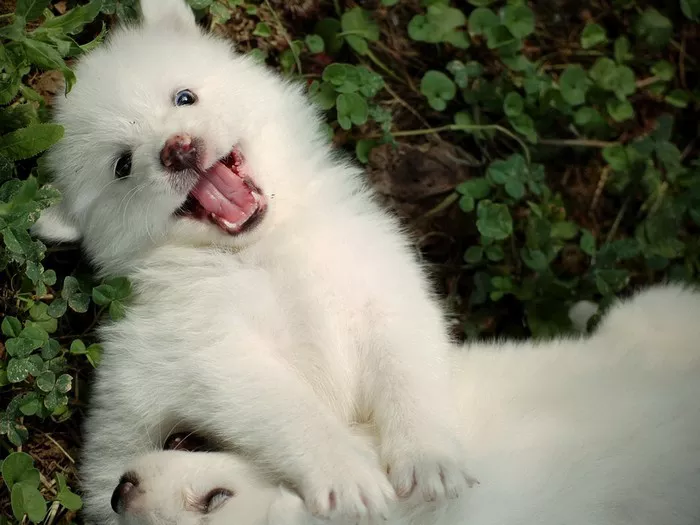Samoyed dogs are known for their beautiful fluffy white coats, but when they can’t stop licking their hair, it can be a cause for concern. There are several reasons why a Samoyed dog might behave this way.
Grooming instinct
Samoyed dogs have the instinct to groom themselves. Licking their fur is a way to keep them clean and free of dirt, debris, and parasites. They may lick off small particles stuck to their thick fur. This is a normal behavior, and as long as it is not excessive, it usually does not cause alarm. For example, after a walk in the park, they might pick up some grass or dust and they’ll lick it up. However, if the licking becomes persistent and compulsive, it may indicate an underlying problem.
Skin allergy
Skin problems are a common cause of excessive licking. Allergies, whether food allergies or environmental allergies such as pollen, dust mites or certain types of grass, can cause itchy skin. When the skin is itchy, the Samoyed will try to relieve the discomfort by licking it. Flea bites are another culprit. Even a single flea can cause intense itching, and the dog will lick the infected area in an attempt to relieve the irritation. Mites, such as demodex or scabies, can also infect the skin of Samoyeds, causing itching and subsequent licking. For example, if a Samoyean is allergic to a particular ingredient in his diet, he may develop red, itchy skin, especially around his face, ears, stomach, or PAWS, and the focus of the licking will be on these areas.
Dry skin
Dry skin can be the result of a number of factors. Low humidity, especially in the winter months when the air is dry, can lead to thinner, itchy skin. Using harsh shampoos or excessive bathing can strip natural oils from a Samoyed’s skin, leading to dryness. If the skin is dry, the dog will lick it in an attempt to moisten it. A lack of essential fatty acids in the diet can also lead to dry skin. For example, a diet consisting primarily of low-quality whole grains is not properly supplemented and may not provide enough omega-3 and omega-6 fatty acids, which are essential for maintaining healthy skin and shiny fur.
Boredom or anxiety
Samoyed is an active and intelligent dog. If they don’t get enough mental and physical stimulation, they will become bored. Licking their hair can be a way of self-soothing or a way to pass the time. Anxiety can also lead to excessive licking. Changes in the family, such as a new baby, a move to a new home, or the absence of a family member, can put stress on a Samoyed dog. Separation anxiety is a common problem, and when a dog leaves alone, it becomes anxious. They may lick their fur as a coping mechanism. For example, if a Samoyed is left alone for a long time without any toys or activities to keep him occupied, he may start licking his fur out of boredom.
Medical condition
Certain diseases can cause Samoyed dogs to lick their own hair. Hypothyroidism is a condition in which the thyroid gland does not produce enough thyroid hormone, which can lead to skin problems and excessive licking. Cushing’s disease is a condition in which the body produces too much cortisol, which can also affect the skin and cause dogs to lick dogs. Skin infections, such as bacterial or fungal infections, can make the skin itchy and painful, prompting the dog to lick. For example, a fungal infection like ringworm can cause round hair loss and itching, and the dog will lick the affected area.
Habitual behavior
Sometimes, a Samoyed dog may get used to it and start licking his hair. If it has had itchy areas in the past, lick it to relieve the itching and it may continue the behavior even if the original cause has been resolved. Or, if it sees other dogs licking itself and mimicking the behavior, it may become a habitual behavior.
Conclusion
If your Samoyed regularly licks its hair, it’s important to watch for other symptoms. Look for signs of skin redness, swelling, rashes, hair loss, or any discharge. Check for fleas or other parasites. Consider recent changes in your dog’s diet, environment, or routine. If the licking persists or is accompanied by other related symptoms, it is recommended to consult a veterinarian. A veterinarian will perform a thorough physical examination, which may include skin scraping to check for mites, blood tests to rule out conditions such as thyroid problems or allergies, and a dietary assessment. Depending on the diagnosis, appropriate treatment can be provided. This may include changing the dog’s diet to make it more suitable for its skin health, using medicated shampoos or topical treatments for skin infections or allergies, providing flea and tick prevention, or addressing any underlying medical conditions. In addition, ensuring that the Samoyed dog gets enough exercise, mental stimulation, and a comfortable and stress-free environment also helps reduce excessive licking behavior.
Related topics


